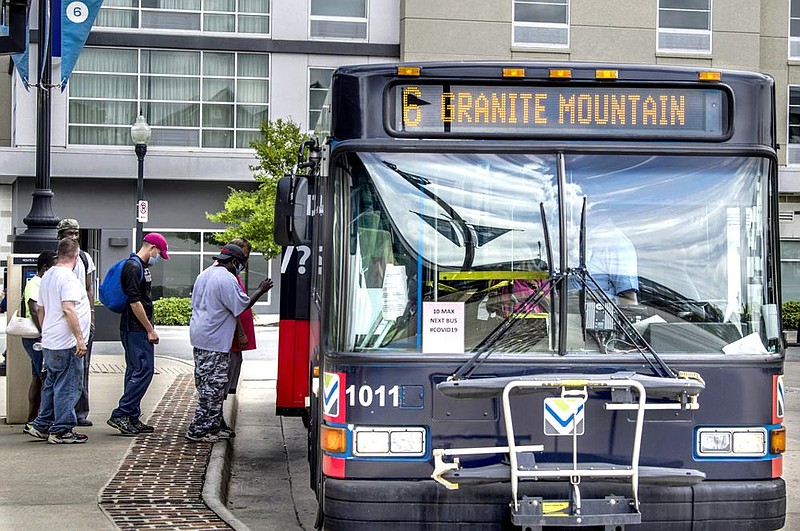Rock Region Metro is planning to implement a new computerized system that would help address every facet of the transit agency's day-to-day operations.
The Intelligent Transportation System would be carried out in phases starting this year.
Khaled Shammout, a consultant architect for the agency, gave a presentation during a Board of Directors meeting Tuesday on how it will work at Rock Region Metro.
Ultimately, the new system will improve operations, reduce maintenance costs, improve service efficiency, safety for drivers and passengers, provide better information to riders, collect critical data, improve the convenience of fare payment and overall mobility, Shammout said.
Phase one of the system will begin soon, including the launch of micro-transit software, an onboard annunciation system, a new fare payment app called Masabi, a trip planning app called VIA, onboard cameras, silent alarms and more.
"We're going to be able to capture data that we have not ever been able to capture," said Justin Avery, chief executive officer of Rock Region Metro. "We're going to be able to have systems that we can rely on and depend on when it comes to [National Transit Database] reporting, when it comes to driver management, operational data that's important for us to capture, such as on-time performance, and other metrics."
The new system is just shy of $8 million, Avery added, which will be fully funded by grants and last until 2024.
Shammout noted that since the agency is expanding its micro-transit service zones, it needs to update its scheduling system to dispatching and vehicle hardware, so dispatchers can see where buses are and communicate with drivers.
"It's going to make riding transit much easier, and it's on your smartphone so that you can just call for a vehicle anytime you want," he added. "And even if you don't have a smartphone, you will be able to call the call center to request that particular trip. It will also increase passenger convenience and provide more options for ADA riders. The more options we have for our customers, the better."
Per ADA, all transit agencies need to announce the major stops and intersections for the visually impaired. With the rollout of the annunciation systems, riders will be more aware of the route stops and other information the agency wants to broadcast over the fixed route vehicles, streetcars and curbside speakers in the mega shelters.
Continuous training will be provided to drivers, as the new systems are implemented, Shammout said.
Avery let the board know that the agency submitted an application for a $2 million grant under the American Transit Training and Apprenticeship Innovations Network for upgrading the fare box system, which will help subsidize the $1.7 million needed to replace the payment system.
If the agency is not given the grant, they still have available funding and will not be asking its funding partners for help, Avery said.
The agency will also draw $10 million in funds from the Coronavirus Aid, Relief, and Economic Security Act, also known as the CARES Act, for eligible operation expenses that have been incurred since Jan. 20, 2020. The proposed 2023 operating budget amendment will increase operating revenues and operating surplus by $10 million. The board voted to approve this amendment.
BUILDING EXPANSION
During the board meeting, Blake Mhoon -- the transit agency's assistant director of finance and procurement -- discussed how the current administration building in North Little Rock has reached its operational capacity and requires an expansion for new employees and departments to handle daily operations.
With direction from staff, AMR Architects provided a preliminary rendering and schematic budget for an expansion to the administration building. The budget for the expansion is $976,550. The new expansion would create six offices, a dedicated space for the customer call center, a utility space that can be used for operator and administration training and additional space for operators.
AMR Architects quoted a flat fee of $85,500 to convert these renderings into actual design development and construction documents so that they can issue an Invitation for Bid on the transit agency's behalf. This fee also includes bid management, contract negotiations and construction administration.
Staff will bring a task order recommendation to the board meeting in June authorizing AMR to move forward with the design development and construction documents phase of the project. After this phase is completed, staff will bring a discussion item for the procurement of the administration building expansion and eventually a contract award recommendation for the winning bid.
NEW BOARD MEMBER
The board welcomed LeCole White as a new member. She has a master's degree in social work and, 15 years of experience serving children and families in human services, early childhood public health and behavioral health programs and education.
White led the implementation of SafeCare Arkansas, "a structured, evidence-based and in-home parenting program that involves a provider and parent working together to create a safe home environment for maltreated children."
"I'm really excited about being a part of the board," White said at the meeting. "I know how important transportation is to so many families, so many individuals even for myself. I really look forward to getting to know you all a little bit better and seeing how I can fit with this team."
The board's next meeting will be on May 16.
CORRECTION: NEORide is a joint procurement group. An earlier version of this article incorrectly described the company.
